Elements: The Invisible Ocean: Hydrogen in the Deep Earth
August 07, 2024
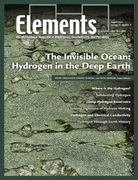
Hydrogen is the most abundant element in the universe and its distribution, transfer, and speciation in the deep Earth remain a fascinating topic of ongoing research. We review the most notable discoveries constraining the H cycle in the deep Earth. This includes new methods for detecting hydrogen, insights into the size of deep reservoirs, and new constraints from inclusions in ultradeep diamonds. Advances in seismic and magneto- telluric imaging provide unique data on the storage and mobility of water in Earth´s interior. Models of the early Earth and of its habitability critically depend on the behavior of hydrogen in a magma ocean–atmosphere system. Later in Earth history, water may have been essential for establishing plate tectonics, a phenomenon making Earth a unique planet.
Geochemical Society members can access this issue now via the Elements website using your email address (UserID) and member number (Password).
Edoardo Ammannati and Goldschmidt Student Helpers to Receive GS Distinguished Service Award
June 25, 2024
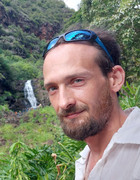
Edoardo Ammannati and the Goldschmidt student helper teams are the recipients of the 2024 GS Distinguished Service Award, to be presented at the Goldschmidt Conference in August. The award recognizes the exceptional contributions made by the student helpers at the conference each year. From helping delegates register at the start of the meeting to making sure that every presentation and poster goes smoothly, the team has become an integral part of the conference. Since his first conference in Florence in 2013 as a team member to his role as team coordinator today, Edoardo has trained and organized hundreds of students over the years. He works from sunrise to sunset (and beyond) each day with the volunteers to ensure a pleasant and productive experience for delegates. Much of their work is done behind the scenes, so on this occasion the GS is very pleased to recognize the extraordinary contributions of Edoardo and the entire student helper teams over the years.
The Distinguished Service Award is presented on an irregular basis to recognize contributions that greatly exceed the normal expectations of voluntary service.
Elements: Cratons to Continents
June 05, 2024
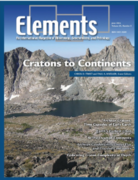
Archean continental crust is present on every continent, but does not constitute a dominant part of any continent’s surficial exposures. Nevertheless, Archean cratons are the longest-lived coherent physical structures on Earth. Viewed holistically, they comprise a welded combination of continental crust and as subcontinental lithospheric mantle keel. They are survivors of what may, or may not, have been a more numerous and varied population of protocontinents. Many of these crustal blocks have origins in the Hadean and have survived for billions of years through many supercontinent cycles. Consequently, these craton-keel structures have influenced the physical and chemical evolution of the silicate Earth. This issue of Elements provides an overview of Archean cratons and the information they retain about the early development of Earth’s continental crust.
Current Geochemical Society members can access this issue now via the Elements website using your email address (UserID) and member number (Password).
Webinar: Open Data in Geochemistry
May 20, 2024

Join us for a free webinar on June 12, 2024 at 10:00 EDT: Open Data in Geochemistry: Making, Delivering and Harnessing FAIR Data with Global Data Providers. This webinar will provide an overview of what FAIR means for geochemical data, what data systems are available to support the management and access of FAIR data, what services they offer, and how researchers can contribute to their success, i.e. their utility, usability, and sustainability by helping them evolve with the needs of the research community.
Timothy Eglinton to Receive Treibs Award from OGD
April 17, 2024
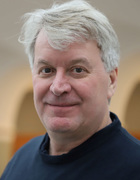
Timothy Eglinton, Full Professor at the Department of Earth Sciences, ETH Zürich (Switzerland), will receive the 2024 Alfred Treibs Award. Presented by the society's Organic Geochemistry Division, the award is given for major achievements, over a period of years, in organic geochemistry. Prof. Eglinton is recognized for his achievements in compound-specific radiocarbon analysis and other areas, which have transformed the field of organic geochemistry and also had a profound impact on various scientific disciplines.
Elements: Metamorphic Duality in SW Japan—The Sanbagawa-Ryoke Classic Example of Paired Metamorphism
April 11, 2024
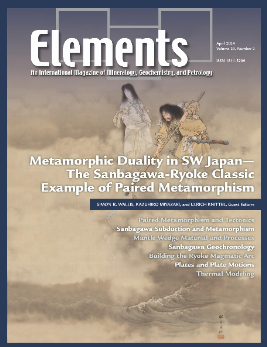
Subduction, where one plate dives beneath another, controls long-term whole-Earth cycling of rocks, fluids, and energy. Plates subduct faster than they heat up, making them the coldest parts of the Earth’s interior. Fluids released from these cold plates rise into hotter overlying rocks, forming magma that feeds surface volcanism. Cold deep conditions associated with subduction complemented by hot shallow conditions under volcanic arcs are reflected in the presence of pairs of metamorphic belts, representing sites of ancient subduction. This issue of Elements guides readers through a premier example of paired metamorphism: the Cretaceous Sanbagawa-Ryoke metamorphic pair of Japan. Estimates of pressure, temperature, the age and duration of metamorphism, and the tectonic framework in which metamorphism took place help us to develop quantitative models—both for the evolution of SW Japan and subduction systems in general.
Current Geochemical Society members can access this issue now via the Elements website using your email address (UserID) and member number (Password).
Hailiang Dong Named Executive Editor of GCA
March 12, 2024
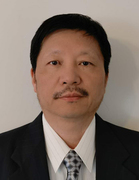
The Geochemical Society and the Meteoritical Society are pleased to announce the appointment of Prof. Hailiang Dong of the China University of Geosciences Beijing as the next Executive Editor of Geochimica et Cosmochimica Acta. He will succeed outgoing EE Jeff Catalano, who has overseen a record number of manuscript submissions and the publication of more than 2,000 papers since 2019. Prof. Dong's term will officially begin on 1 January 2025.
"I am grateful to our authors and reviewers for persevering with us through the COVID-19 pandemic and the barriers that they faced to accessing our journal," said Catalano. Under Catalano's tenure, GCA has witnessed a substantial increase in the gender and geographic diversity of the GCA editorial board, adjusting its membership to better reflect our community. "The greatest strength of GCA is its excellent Associate Editors, who are true leaders in our field," said Catalano. "They provide the critical foundation for ensuring GCA's continued success as the premier journal for fundamental research in geochemistry and cosmochemistry under my esteemed successor, Hailiang Dong."
Prof. Dong brings a wealth of experience relevant to the journal. In addition to being an Associate Editor for GCA since 2016, he has served as Co Editor-in-Chief of Chemical Geology since 2017 as well as for the new journal, Geo-Bio Interfaces, since 2023. He also served as a program manager with the U.S. National Science Foundation from 2014 to 2016.
Prof. Dong completed his B.S. at the China University of Geosciences Wuhan, his M.S. at the China University of Geosciences Beijing, and his Ph.D. at the University of Michigan, where he studied Ar-Ar dating of clay minerals. He then transitioned into a distinguished research career focused on microbe-mineral reactions during a postdoc at Princeton University followed by professorships at Miami University and China University of Geosciences Beijing. His area of expertise is in microbial, environmental, and isotopic geochemistry, including 40Ar/39Ar dating of clay diagenesis; microbially catalyzed mineral reactions; biogeochemical cycling of elements; remediation strategies of contaminants; and medical applications of clay minerals. He is a Fellow of the Geochemical Society and the European Society of Geochemistry and the Geological Society of America.
Donald Canfield Named 2024 Victor M. Goldschmidt Medalist
February 19, 2024
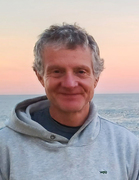
Donald E. Canfield, Professor and DIAS chair at Syddansk Universitet (Denmark) will receive the 2024 Victor M. Goldschmidt Award this August. The Goldschmidt Award is the society's highest honor, presented annually for major achievements in geochemistry over a career. Prof. Canfield is recognized for his reinvention of how to extrapolate sophisticated mechanistic understandings of microbial metabolisms and their elemental and isotopic consequences to elevate our understanding of Earth's environmental and biological history.
Satoshi Utsunomiya Named 2024 Clair C. Patterson Medalist
February 19, 2024
Satoshi Utsunomiya, Associate Professor in the Department of Chemistry, Kyushu University (Japan), will receive the 2024 Clair C. Patterson Award in August. The award is presented annually for an innovative breakthrough in environmental geochemistry of fundamental significance within the last decade, particularly in service to society. Prof. Utsunomiya is recognized for his creative application of advanced techniques, especially electron microscopy and spectroscopy, to the understanding of the environmental mobility of radionuclides, and other elements/particles of concern. His research provides the foundation for estimates of health effects and the development of mitigation/decommissioning strategies.
Jihua Hao Named 2024 F. W. Clarke Medalist
February 19, 2024
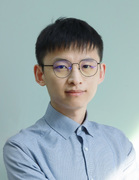
Jihua Hao, a Professor in the Department of Geochemistry and Planetary Sciences of the University of Science and Technology of China, will receive the 2024 F. W. Clarke Award this August. The Clarke Award honors a single outstanding contribution to geochemistry or cosmochemistry by an early-career scientist. Prof. Hao is recognized for his work on quantification of early Earth and planetary geochemical conditions and processes. In particular, he developed models of late Archean weathering, river-water chemistry, and the availability of phosphorous on the early Earth and Enceladus.